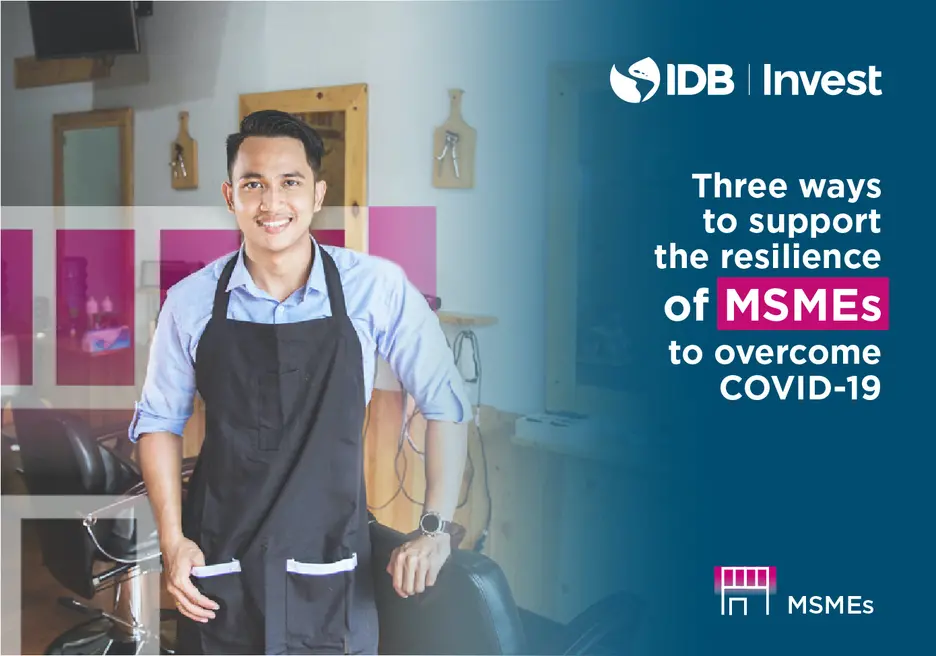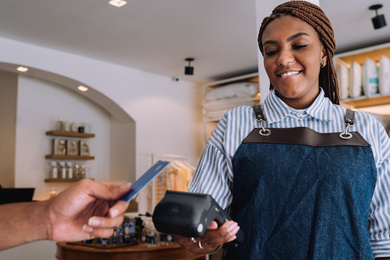Three Ways to Support the Resilience of MSMEs to Overcome COVID-19

Every day feels like June 27. As we are all confronted with the disproportionate impact the COVID-19 health pandemic and its ramifications has had on MSMEs, and how their well-known challenges have been exacerbated, June 27 is the day we celebrate the United Nations World Micro Small Medium-sized Enterprises Day, which reminds us of their significant contributions to economic growth and sustainable development.
This impact will imply high social and economic cost in the region, considering almost 99% of Latin American companies are MSMEs accounting for 67% of employment. MSMEs are also often the only ones reaching the ‘last mile‘ with essential goods and services. Due to social distancing measures taken by governments across the region; many MSMEs unable to transition to remote working, are experiencing plunges in demand of goods and supply chain disruptions; while bills and debt pile up, and scarce working capital diminishes. The survival of many MSMEs is at risk, as they are forced to scale down operations and lay-off workers. Further, those MSMEs operating in the informal economy will find it more difficult to access emergency support from governments.
Dominating the response
Avoiding the collapse of MSMEs is in everyone’s interest. Governments fearing an exacerbation in already high inequality in the region; large enterprises whose retailers, producers, suppliers, and distributors are MSMEs; financial institutions serving the MSME segment –they all share this common goal and are mobilizing efforts to support MSMEs. Focus is often divided among the immediate response to ensure short-term survival, along with scenario playing that can help line up recovery efforts. For this, it is essential to strengthen their resilience.
Resilient businesses will be those that overtime can enhance their abilities to anticipate, understand and respond to disruption risks and vulnerabilities (economic, physical, environmental, governance or social). Such response from businesses would not only require from them the capacity to evolve and adapt to new circumstances but will also ask of them to leverage their spheres of influence to give shape to the ecosystem in which they want to operate. This is where resiliency and sustainability are deeply interconnected. Sustainability –envisions a better society and a better planet– acts as the compass for the reconstruction and resiliency efforts.
Prior to COVID-10, we were seeing an increased commitment from governments and companies in the region to the SDGs and the Paris Agreement. When the pandemic hit, we were left guessing if we would see reversals, stagnation or acceleration on these commitments. We are of the optimistic view that companies now more than ever understand sustainability as a core pillar of their business strategies, one that gives them foresight, a competitive edge that ensures business continuity overtime and an alignment with the purpose they serve to society.
For large companies, resiliency of their own operations will only be a fraction of the work ahead; supporting partner MSMEs across complex value chains will become an integral part of the effort. For financial institutions, resiliency will entail ensuring service continuity, data safety and security and customers’ and organizational financial wellbeing.
Playing the vital role
Both large companies and financial institutions can play a vital role in enabling MSME resilience and their ability to weather future disruptions. How?
1. Financial capacity:
Supporting MSMEs with a range of financial instruments that allow them not only to survive, but to provide decent employment, grow their business, make long term investments, and innovate. Taking advantage of emerging digital platforms, and democratization of data can offer new opportunities to offer non-traditional, digital financing solutions that can provide more transparent, affordable and accessible finance to MSMEs. Financial capacity can also be supported through tools and financial guidance for MSMEs on how to manage their debt and maintain their financial health over time.
2. Capacity to adapt to new market conditions:
The COVID-19 crisis has evidenced the need for companies to embrace digitalization, which creates unprecedented opportunity for development and innovation. As companies and financial institutions accelerate their digitalization efforts, it’s important that they do so with a mindset to drive inclusion of MSMEs, facilitating their access and affordability of products and services, and overcoming infrastructure challenges. In addition, MSMEs themselves will need to adapt and become digitally engaged in order to respond to new market needs. MSMEs will need support to become digitally engaged through access to affordable digital solutions that can be easily implemented for their business (i.e. e-commerce platforms, digital payments, data mining, traceability, etc.); building digital skills and ensuring cybersecurity and appropriate data management among others.
3. Embracing sustainable practices:
Upholding ambitious sustainability policies and plans; and supporting MSMEs to align to corporate sustainability goals will ensure not only the long-term viability of value chains, but also the capacity of MSMEs to remain and grow within those value chains.
Becoming resilient and embracing sustainable behaviors, require shift in mindset. While we can’t claim that COVID-19 has changed our mindsets, it has certainly pushed us in the right direction – it has enhanced our awareness, empathy, capacity of collective and decisive action and our willingness to embrace change.■
LIKE WHAT YOU JUST READ?
Subscribe to our mailing list to stay informed on the latest IDB Invest news, blog posts, upcoming events, and to learn more about specific areas of interest.
Subscribe



